Women Are Safe: Medical Press Conference
Women confirm pro-life 8th never prevented life-saving treatments in pregnancy. Event chaired by Dr. Eamon McGuiness
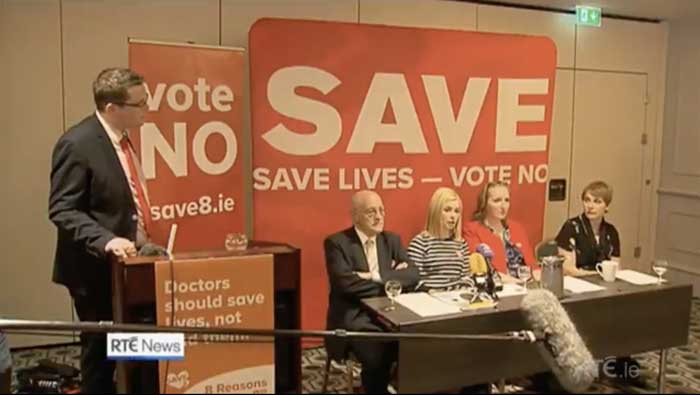
Press Conference covered on RTE Six One News
Women are Safe Medical Press Conference featured on the RTE News at Six. Thank you Dr. Eamon McGuinness, Audrey, Louise and Ciara for telling your stories.
Women who had life-threatening conditions arising in pregnancy, or suffered miscarriages, told a press conference today that their doctors had not been prevented from intervening to save their lives by the pro-life 8th amendment.
They were joined by Dr Éamon McGuinness OB/GYN, former chair of the Institute of Obstetrics and Gynaecologists who said that doctors were free to act to save mothers and that there was a “campaign of fear and misinformation” by those who supported legalising abortion.
Dr McGuinness also pointed to the Medical Council guidelines which all doctors must adhere to, and which he said were “very clear – Section 48 stipulates even if a threat to the mother’s life is “not immediate or inevitable”, it can be acted upon.”
He was joined by Audrey McElligott who was treated for stage 4 cancer when pregnant and who said “abortion is not healthcare and Ireland’s 8th Amendment doesn’t prohibit pregnant women from receiving the life-saving medical care that they need. I am living proof of that.”
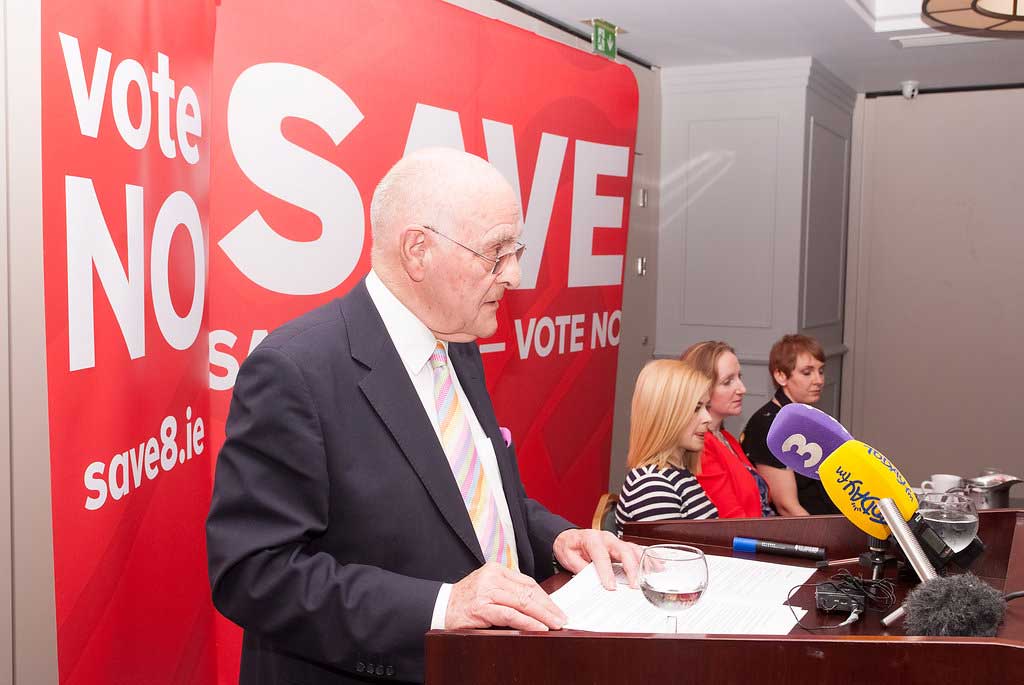
Dr. Eamon McGuinness
OB/GYN, and former chair of the Institute of Obstetrics and Gynaecologists
Also speaking was Louise Dunleavy who said that during her fifth pregnancy she developed life-threatening sepsis, the same condition that led to the tragic death of Savita Halappanavar. “I know from first-hand experience that doctors were not constrained by the 8th Amendment from acting to save my life,” she said. “The law in Ireland on abortion didn’t impact my treatment, or the planning of my treatment, at all. The treatment was immediate and the discussions didn’t ever pertain to the law on abortion. Doctors acted immediately and they acted in the same way they would’ve acted in any other country, with the appropriate treatment for my condition. If they had needed to deliver my baby early in order to treat me, they would have.
Ciara Kavanagh spoke about her tragic experience with miscarriage and about the baby she had lost at 11 weeks. “It was made very clear to me that I was the priority and that the doctors would act immediately to deliver the baby if I was in danger,” she said.
You can read their full remarks below, with media links before that. Thanks to these brave mothers for speaking out today and to Dr McGuinness for his commitment and care to mothers and babies.
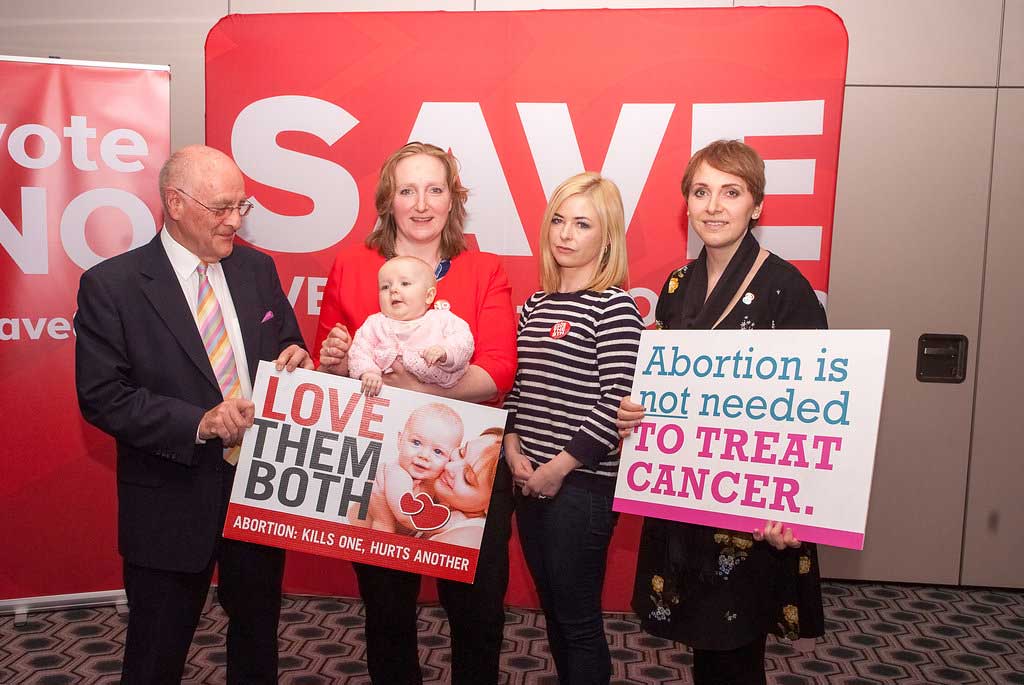
- All Categories
- Filter 1
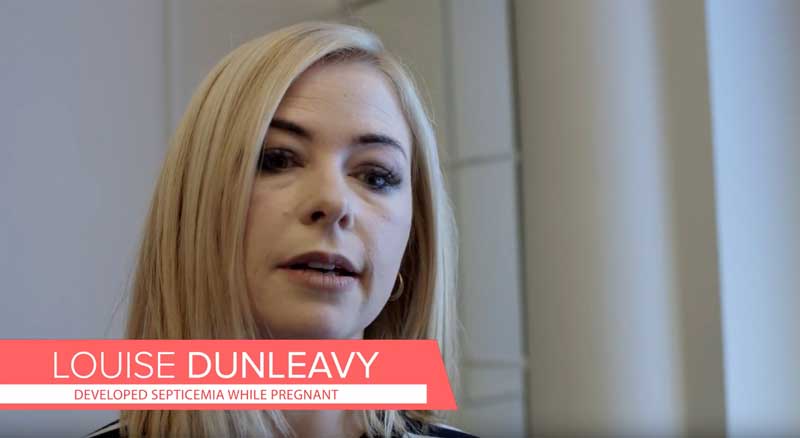
Louise Dunleavy
Treated For Septicemia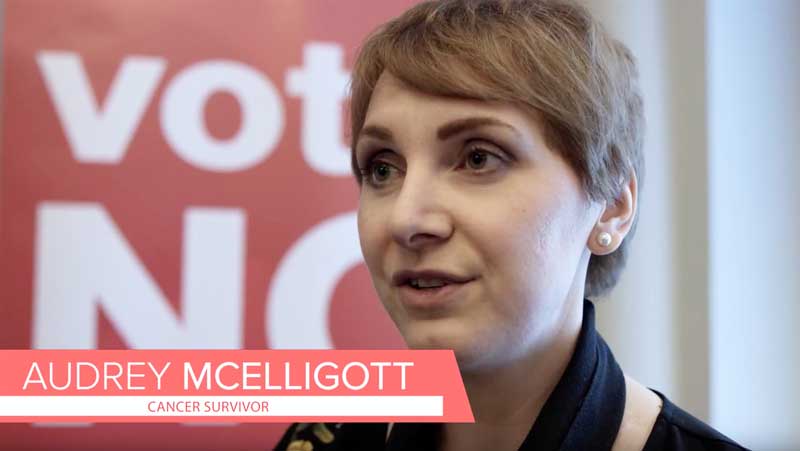
Audrey Mcelligott
Treated For Cancer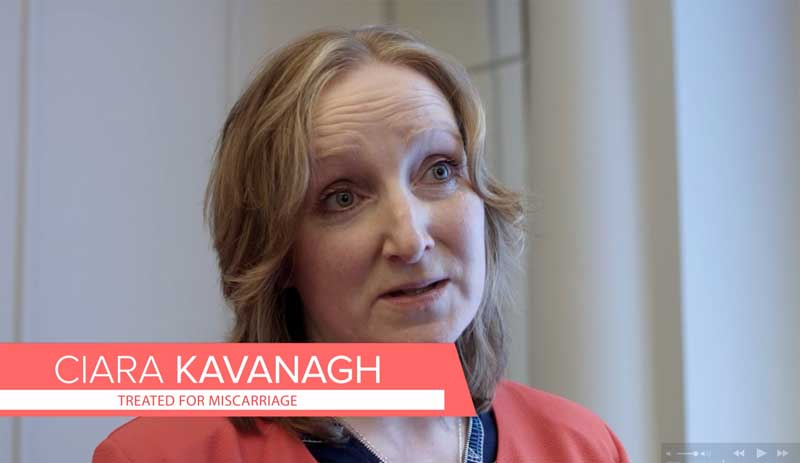
Ciara Kavanagh
Treated For Miscarriage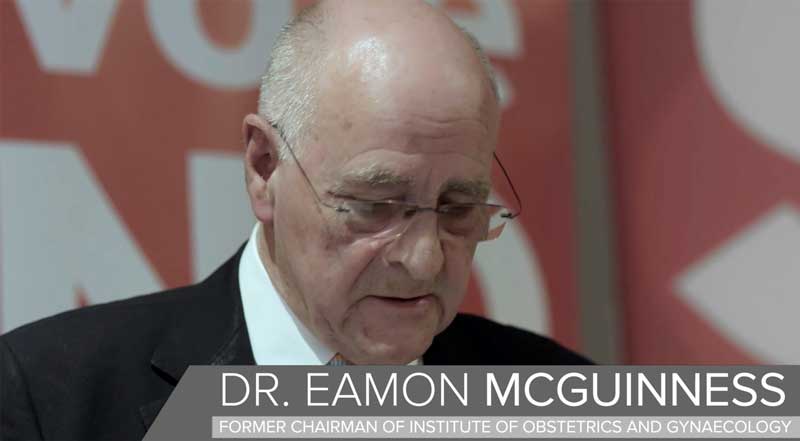
Dr. Eamon McGuinness
Women Are SafeDr. Eamon McGuinness
Good morning, and thank you all for coming.
I have to say, I had no intention until relatively recently of becoming involved in this referendum campaign.
Abortion is a very difficult issue. It has touched many families. In my long experience, it often touches men as well as women.
Many people have deeply personal convictions on the issue, and many years of working with women and their unborn babies have convinced me beyond any doubt that the unborn child is human, and deserving of protection under our constitution.
But we are not here today to discuss personal views. We are here, I hope, to clarify some matters of fact.
The public are legitimately and rightly eager to make the best decision on May 25th for women and their unborn children.
They want to live in an Ireland, as I do, that provides the very best in maternal care. An Ireland where women are safe, and where pregnancy is safe.
I have had the honour of being the Chairman of the Institute of Obstetrics and Gynaecology. I have also delivered more babies than I care to remember.
One of the things about this job is that you encounter people at moments of tremendous joy, because everyone remembers the birth of their child. To be present and involved at such special moments is one of the true gifts of our profession.
Of course, not every pregnancy has a happy ending. There have been moments of incalculable sorrow and pain for families. Nature can be cruel, and that cruelty is never more keenly felt than in the loss of a child, or the news of some terrible diagnosis.
Our job, as doctors, is to provide the very best care we can in moments of joy, and in moments of sorrow.
I want to be very clear about what I say next:
The 8th amendment has never impacted my ability to provide the best healthcare that women and their babies expect and deserve. To my knowledge, no woman in Ireland has lost her life because the 8th Amendment prevented best care, and my colleagues have testified to that in several Oireachtas Committees, in both 2013 and in 2000.
We are joined today by three brave women – Audrey Mc Elligott, who was pregnant when she was diagnosed with cancer, Ciara Kavanagh whose baby was lost to miscarriage, and Louise Dunleavy who suffered life-threatening sepsis in pregnancy.
In each case, the Irish health service, and my colleagues in Obstetrics and Gynaecology, were able to treat them fully, and effectively.
But they will tell you their own stories.
What I can tell you, and indeed what I can tell the Irish people, is this:
No Irish doctor will ever fail to intervene when they know the life of a woman is at risk, even if that risks the life of an unborn child.
We are tasked with caring for both patients, but when a conflict arises, we are very clear about where our primary duty lies – in saving the mother, and giving her all the help she needs, even if that means that the life within her will not survive.
I have had to do that myself, working under the auspices of the 8th amendment. Where a woman has developed a uterine cancer, for example, it has meant that I have had to advise and carry out an early termination of pregnancy. Nothing in the law prevented me from doing so.
There is perhaps a misconception that under current law a woman has to be actually dying before we can intervene to end a pregnancy – again this is untrue.
The Medical Council guidelines which all doctors must adhere to are very clear – Section 48 stipulates even if a threat to the mother’s life is “not immediate or inevitable”, it can be acted upon.
Of course, what is often ignored in this discussion is that for the overwhelming majority of women who fall ill in pregnancy, losing the baby is something that they do not wish to do.
So let me be clear on this further point: In nearly every case, we are able to treat a woman without harming her unborn child. Pregnancy does not prevent chemotherapy, or other treatments for cancer. It does not prevent treatment for life-threatening conditions arising in pregnancy.
Sadly, those who say that the 8th amendment prevents Irish women from getting the treatment they need are either gravely mistaken, or substituting their personal views for medical facts.
I have heard another, even more upsetting tale, as of late.
There are those who have been arguing that in Ireland a woman whose baby dies in utero are made to carry that child inside them for such an extended period of time that it endangers their lives or caused them great distress.
That is completely untrue, and it must be corrected.
Again, the clinical practice guidelines from the HSE directing the management of first and second trimester miscarriage are very clear.
Sometimes, for clinical reasons and according to best international medical practice, we will advise a woman to wait, if she is able, to deliver the child naturally. The guidelines explain that conservative management is an effective and acceptable method to offer women who miscarry provided there are no signs of infection or excessive bleeding.
“However,” the guideline also explains, “if the woman requests a surgical or medical approach to their management at any stage it should be arranged.”
HSE guidelines for the management of second trimester miscarriage also state that “second trimester of pregnancy delivery should be considered for women with chorioamnionitis irrespective of fetal viability.”
I am drawing your attention to these guidelines because it has been claimed that doctors have their hands tied by the 8th amendment in these cases, but the guidelines, and the medical reality, show these claims to be without substance.
The 8th amendment does not and cannot prevent us from intervening when required to do so in these cases. It protects the life of the unborn child. It does not prevent us from intervening after the death of an unborn child. And yet, many people are being led to believe that it does.
The 8th amendment has one impact and one impact alone: It prevents doctors like me from intentionally ending the life of the unborn child. That is all it does.
We are being asked to legalise abortion, in the great majority of cases under this proposal for healthy mothers, carrying healthy babies.
That is not medicine. It is, very literally, the opposite of medicine.
Some colleagues have a view that supports such a law. They are entitled to that view. But it has been very disturbing to see what amounts to a campaign of fear and misinformation deployed to tarnish the image of Irish medicine and make Irish women fearful of the treatment they might receive.
The most recent enquiry into maternal safety, in 2017, and found, yet again, that Ireland is one of the safest places on earth to be a pregnant woman.
It is perhaps THE safest place on earth to be in the womb.
Respectfully, I am asking the Irish people to keep it that way and to ‘Vote No to Abortion’ on May 25th.
Audrey

My name is Audrey McElligott and I was treated for stage 4 cancer while pregnant in Ireland. I am speaking here today because I am appalled to see abortion campaigners falsely claiming that women can't get cancer treatment in this country under the 8th amendment. I am speaking here today because I am appalled that campaigners are using fear and untruths to try to frighten women into voting for abortion.
I was almost three months pregnant with my second baby in September 2012 when I felt a lump on my neck. I went to the GP the very next day and he told me it was a benign cyst and put me on the waiting list to see an ear, nose and throat doctor. I would be scheduled for an appointment in the new year.
Time went by and the lump kept getting bigger and new lumps were forming on my neck. I went to all of my prenatal appointments and everything with the baby was fine. It wasn't until late October that my consultant saw the lump in my neck and asked me what it was. I said the GP had assessed it was a benign cyst and she said it needed to be checked out.
I went a couple weeks later and first heard the words, "we think its cancer." It was urgent that I get treated and I needed to undergo surgery, even while I was six months pregnant. During the surgery, the doctors found that I had stage four Hodgkins Lymphoma. It had spread to my lungs, liver, and spleen.
Everyone at Our Lady of Lourdes Hospital did everything they could to save me and my baby. As with any surgery or chemotherapy, the doctors told me there would be risks for my baby and me. However the literature showed convincingly that almost no baby was ever harmed by going through the chemotherapy they had planned for me. But they said, ''there is always a small chance things could go wrong.''
I went through chemotherapy for three cycles while pregnant. The delivery of the baby was a scheduled cesaerean so that it would coincide with my chemotherapy which kills my immune system so that I wouldn't be at a risk of infection.
On March 19th, 2013 our second baby Joseph Francis was born a healthy 8 pounds 7 ounces with a full head of hair. The nurses had warned us he might have alopecia from the chemo, But he proved them wrong. The doctor's tested his umbilical cord and there was no trace of chemo in his body.
I am so happy no one ever mentioned the word abortion to me. I know that in many other countries in the world they would have advised abortion to protect the system from any liability that might occur if the baby was affected by the chemo, but not in Ireland where, because of the 8th Amendment, doctors treated both me and my baby and saved both our lives. I am so grateful that I live in a country where medical professionals did everything they could for my baby and for me, without abortion.
The truth behind the abortion spin we are hearing now is that if you have cancer while pregnant there is hope for both of you. Abortion is not healthcare and Ireland’s 8th Amendment doesn’t prohibit pregnant women from receiving the life-saving medical care that they need. I am living proof of that.
Louise

During my fifth pregnancy I developed life-threatening sepsis, the same condition that led to the tragic death of Savita Halappanavar. I know from first-hand experience that doctors were not constrained by the 8th Amendment from acting to save my life.
I was off work and rundown and tired. Then I developed a very bad chest infection. A couple of weeks later, I noticed a strange pain in my back. I went to the doctor, but they didn’t really know what was wrong with me, but it became clear that it was more than a pulled muscle or back ache, or any of the normal things that pregnant women often suffer from.
The doctors decided I needed to get an MRI to figure out exactly what was going on. After two or three days in the hospital, I began getting quite frightened... I had four small children at home and I really wasn’t feeling well at all. As I came out of the MRI, there was an orthopedic team waiting for me.
They told me they’d discovered an abscess on my spine. It meant very little to me, but what it actually was was a collection of infected fluid around my spinal cord and epidural space, which was compressing on my spinal cord.
I had never heard of this condition before - it’s called spinal epidural abscess. I didn’t understand the severity of it, and that I was rapidly heading towards paralysis and the next state would be death. But doctors worked very efficiently and aggressively to treat me straight away.
The doctors originally thought they were going to have to do surgery, and in order to that they would have had to end my pregnancy by delivering my baby early. I was so unwell, and so distressed -- that for a moment I had forgotten I was even pregnant. The doctors were very concerned and I was their priority throughout all of this.
In some circumstances, if the patient hasn’t begun to lose power in their legs and if the doctors are able to obtain a sample of the infected fluid, sometimes they’re able to treat the infection aggressively with antibiotics.
Fortunately for me, the doctors were able to obtain a specimen of the bacteria that was causing the infection from my spine -- and they were able to treat it with antibiotics. I was very lucky that I hadn’t began to lose power in my legs, but had I began to lose power they would have needed to operate.
After 48 hours on this very aggressive antibiotic therapy, I began to notice that the painkillers they had given me were beginning to work. Up until this point I had remained in excruciating pain. I had to remain in hospital and on intravenous antibiotics for six more weeks and after that point they continued to monitor me and administer the antibiotics.
Unfortunately in my case, the infection had spread to my bloodstream and I was very sick with septicaemia, which is an infection of the blood.
My pregnancy didn’t impact my treatment at all. As far as I’m aware, my treatment was exactly the same as it would’ve been if I wasn’t pregnant. I never felt as if I were being treated differently because I was pregnant.
As a nurse and having had worked in intensive care, I recognize septicemia as being incredibly serious and life-threatening - and I’ve seen people die, even healthy people, of septicemia. So I was very concerned and upset, but I knew the doctors were doing all they could to save my life.
My first day of treatment, I remember a doctor coming into me and tell me how lucky I was. I had very narrowly escaped being paralyzed and I had come maybe within 12 hours of death. This was a shock to me. I think we all think we’re invincible. Even when we understand conditions, we think they don’t really apply to us.
After the six weeks of antibiotic therapy, I went into labor. So I recovered from my cesarean section and did my last week of the antibiotics, and then I was able to go home after seven weeks in the hospital.
The law in Ireland on abortion didn’t impact my treatment, or the planning of my treatment, at all. The treatment was immediate and the discussions didn’t ever pertain to the law on abortion. Doctors acted immediately and they acted in the same way they would’ve acted in any other country, with the appropriate treatment for my condition. If they had needed to deliver my baby early in order to treat me, they would have.
I believe there is a big difference between the death of a baby because of treatment for the mother, and the intentional killing of that baby. Had my baby died as a result of the treatment because of my ill health during the pregnancy, I would have been very upset and offended if my baby was included in abortion statistics, because it wouldn’t have been an abortion. If women lose a baby because of their ill health, I’m sure that their treatment being labelled an abortion would be very upsetting for them. I think abortion campaigners are scaremongering and trying to frighten women, when the facts show that women like me are safe under the 8th amendment, because abortion isn't healthcare. It is life-ending, not life-saving.
Having had five pregnancies in Ireland, two of them born premature -- one was born very premature, and myself being very ill in one of my pregnancies -- my overall experience with maternity and women’s healthcare in Ireland has been very positive. Today my five children and I are very healthy.
Ireland’s 8th Amendment has never prevented Irish women from getting the life-saving treatment they need. Women deserve the best care, not abortion. Real healthcare saves lives and abortion, the deliberate taking of a baby's life, is not needed to treat sepsis or any condition in pregnancy.
Ciara

Good morning, and thank you all for coming.
When I was about 9 weeks along with my 5th child, I went in for a scan at a pregnancy care centre. They were training one of their new technicians that day. I had seen lots of scans and was expecting to hear the usual commentary, “Ah, I can see your baby there. You can hear the heartbeat".
I’ve always thought it was incredible how perfectly formed the baby was so early on. Even at 10 weeks it looks like a little person in the womb -- not a blob of cells or tissue like some would want you to imagine. Life is incredible and beautiful and sacred. But this time it was different.
As I mentioned before, the pregnancy care centre was training a new scan technician, so when she couldn’t find my baby’s heartbeat, I just assumed it was because she was new and that she had made a mistake. But they checked again, and there was nothing. No heartbeat. I went to my own doctor who told me that the baby would very likely miscarry naturally, but that if this didn't happen I would need to go in for a D&C. It was explained to me that it was better for me if the miscarriage happened naturally but that I should come back or go to the hospital if I was uncomfortable or the miscarriage started.
We waited for two weeks, and the miscarriage began at 11 weeks and I had to go into the hospital for a D&C as I was losing blood. It was made very clear to me that I was the priority and that the doctors would act immediately to deliver the baby if I was in danger. I was scanned and then shortly afterwards, I was brought down to theatre for a D&C. I was in the hospital for 2-3 days for the D&C and was closely monitored by my doctors and nurses. The hospital just had me rest and didn’t allow me to do anything, not even walk down the hallway by myself.
Ireland has excellent care for expectant mothers. While I was grieving over the loss of my baby, I felt that my child and I were both cared for with the utmost respect. I received a lot of kindness and support from the staff in the hospital, they were really lovely to me. I buried my baby in Glasnevin cemetery in the Little Angel's plot close by my own baby brother.
Ireland’s 8th Amendment protects babies in the womb, like my child who didn’t survive, while also protecting the lives of mothers like me. I think that it is appalling to see groups claiming that women who suffer miscarriages are in danger under the 8th amendment when that is simply not true. Irish doctors and nurses should be applauded for their excellent care for mothers and their babies, and I for one am glad that I live in a nation that respects the lives of mothers and babies -- while providing them with the care they need.
Press Links
- Medical myths about the 8th must be challenged: Irish Times : 6 April 2018
- RTE News at 6:https://www.rte.ie/player/ie/show/rte-news-six-one-30003249/10862757/
- RTE News: Doctor hits out at 'campaign of fear' over Eighth Amendment: https://www.rte.ie/news/eighth-amendment/2018/0410/953421-eighth-amendment
- Independent: "The 8th Did Not Stop Doctors from Acting to Save me" : https://www.independent.ie/irish-news/abortion-referendum/eighth-did-not-stop-doctors-acting-to-save-me-36795994.html
- Irish Times: Retired doctor says 8th Amendment did not stop him from treating women: https://www.irishtimes.com/news/health/retired-doctor-says-8th-amendment-did-not-stop-him-carrying-out-abortion-1.3457341
- The Journal: Doctor says no woman has died because of the 8th amendment: http://www.thejournal.ie/eamon-mcguinness-eighth-amendment-3949918-Apr2018/
- Examiner: Save the 8th group defends claims of 1 in 5 babies in England aborted: https://www.irishexaminer.com/breakingnews/ireland/latest-save-the-8th-group-defends-claims-of-1-in-5-babies-in-england-aborted-836576.html
- Irish Times: Wife of former Taoiseach John Bruton advocates No vote in referendum: https://www.irishtimes.com/news/ireland/irish-news/wife-of-former-taoiseach-john-bruton-advocates-no-vote-in-referendum-1.3457537
- Irish Times: Both Sides neck-in-neck for funding in abortion referendum: https://www.irishtimes.com/news/health/abortion-referendum-money-pouring-in-from-small-donors-both-sides-claim-1.3457117
- Report on Catholic Ireland website : 14th April 2018
